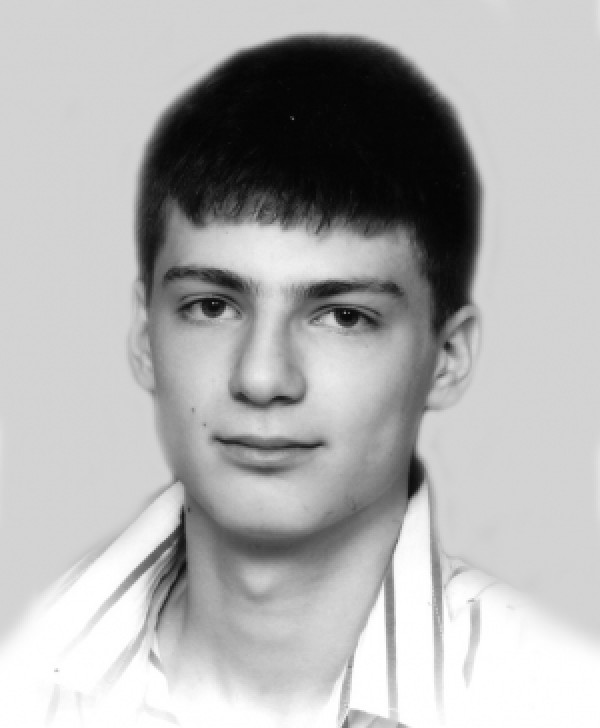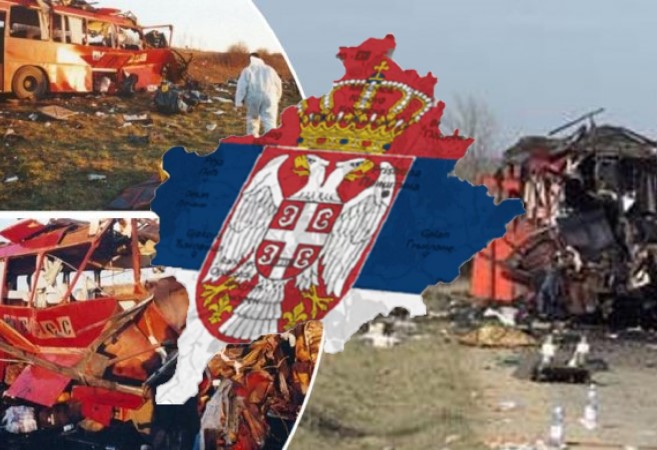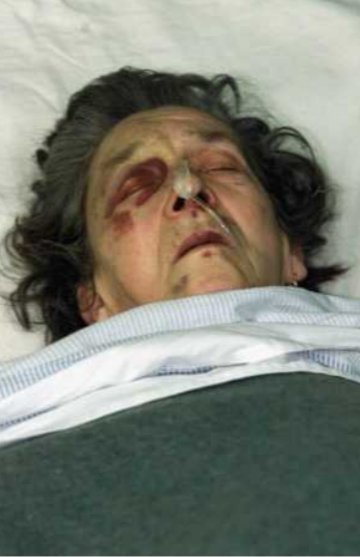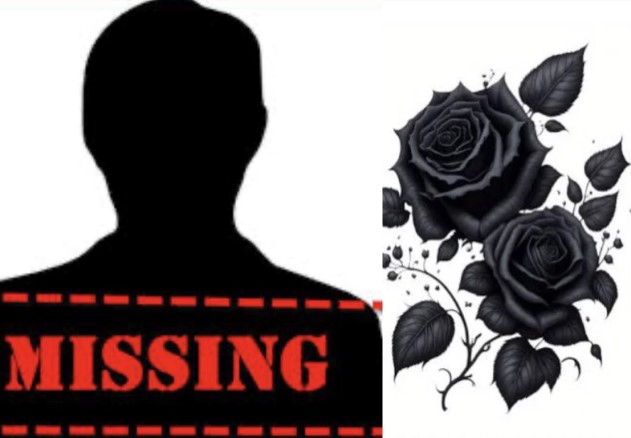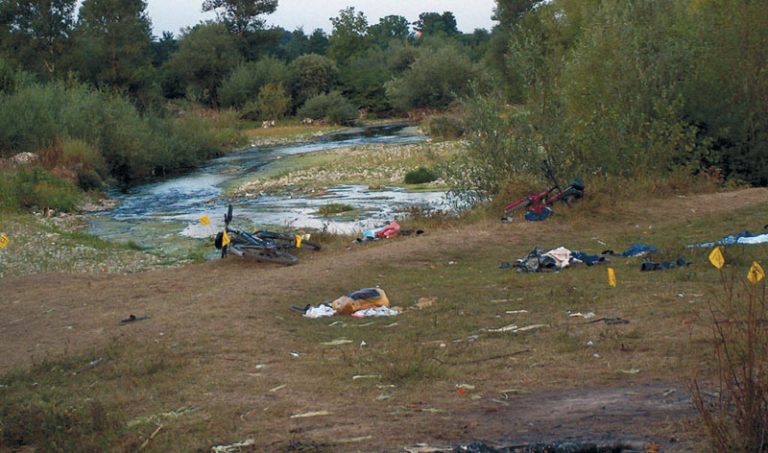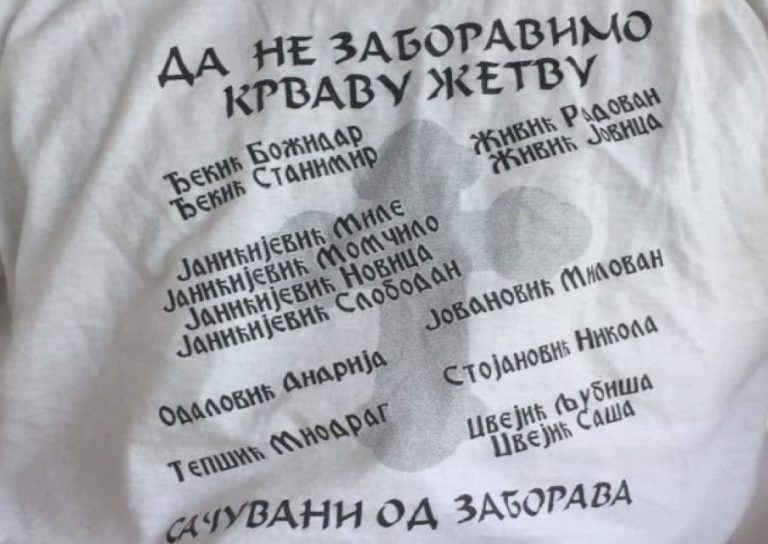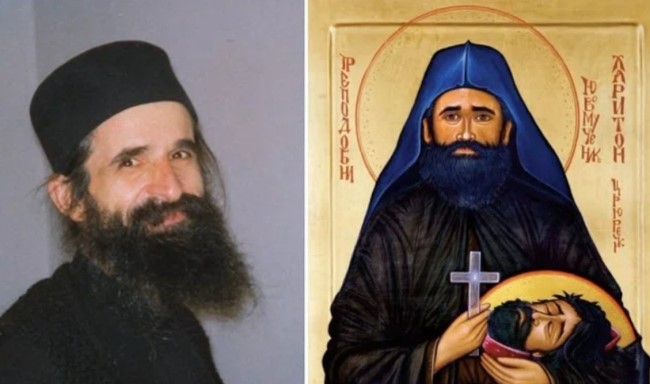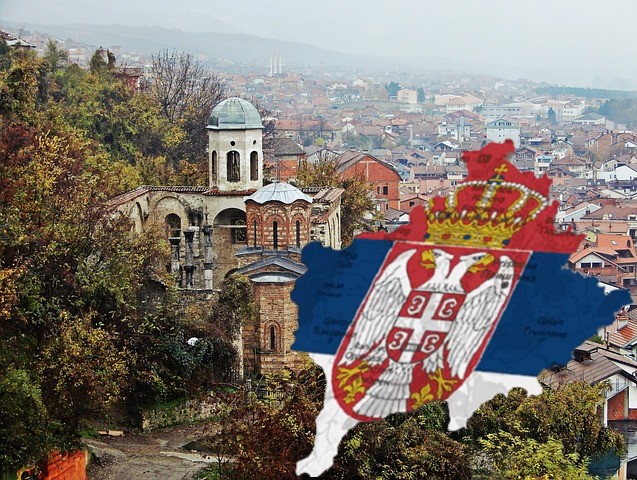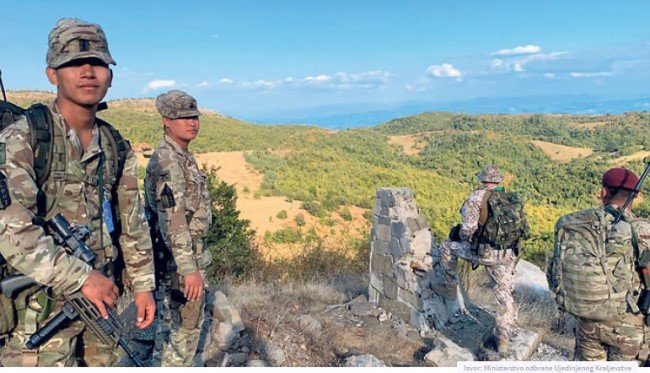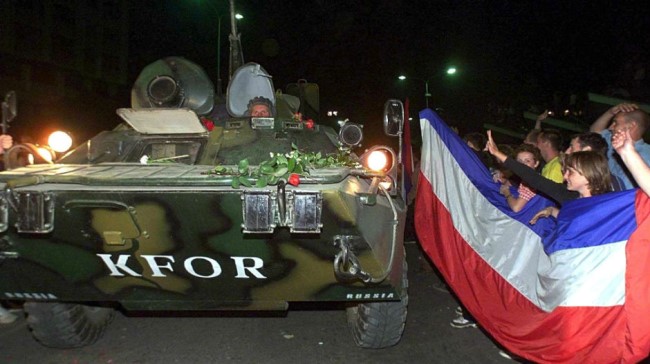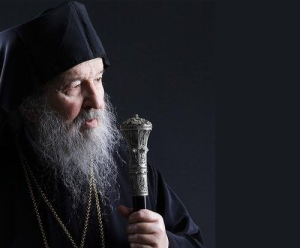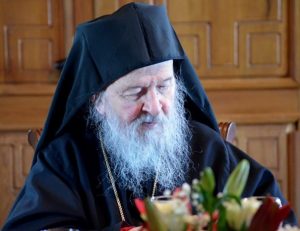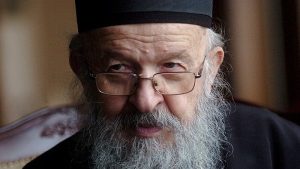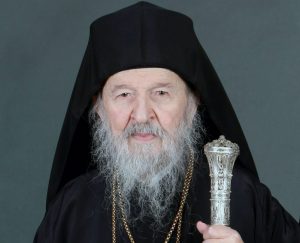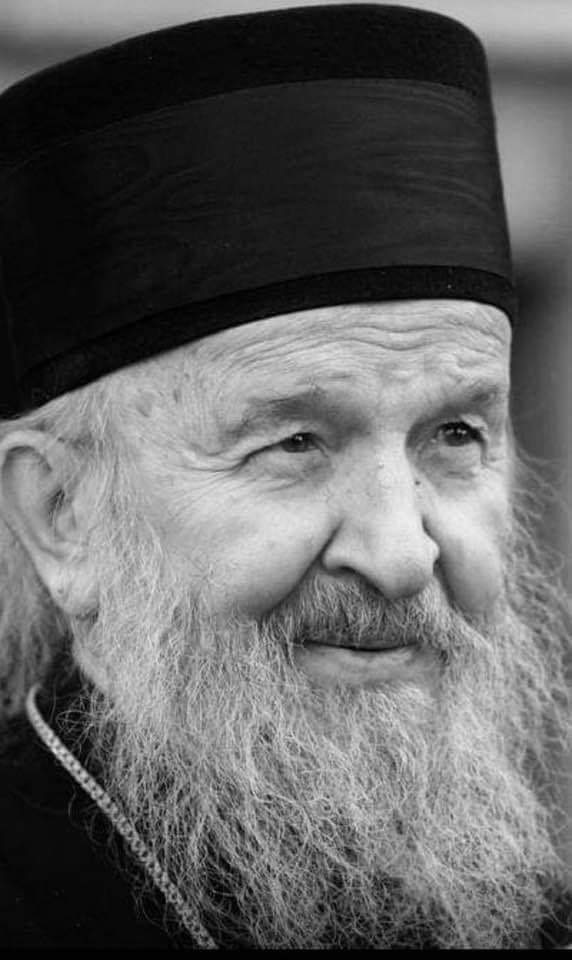
SPC IS GUILTY, IT DID NOT DEFEND KOSOVO
Amfilohije, Atanasije and Irinej Bulović betrayed the church and the Orthodox faith
When he was elected bishop of Raška-Prizren in the spring of 1991, Artemije Radosavljević spent the next eight years, until the beginning of the war, reviving the diocese in which the most important Serbian shrines are located. After him, several dozen mostly young monks came from the Crna Reka monastery and other Orthodox temples to Kosovo and Metohija, who revived Visoki Dečani, Prizren, Velika Hoča, Banjska, Devič, Gračanica... In the 1990s, in Kosmet, under the "patronage" of Bishop Artemije, about 100 churches were built, several church baptisms were organized, and the people began to return to the church and religion. Bishop Artemije, along with Patriarch Pavle, was the most popular monk among the people. He believed and advocated that Kosovo and Metohija would never remain without Serbia. However, not long after the bombing and occupation of the southern province, Bishop Artemije seriously opposed the attempt to make Serbian medieval monasteries a Kosovar, read Albanian, heritage, and he resisted the ambivalent policy towards Kosovo pursued by the authorities in Belgrade and the top of the Serbian Orthodox Church. The glass of bile spilled over when he publicly opposed US Vice President Joseph Biden to visit the Visoki Dečani monastery without his blessing. Neither the members of the Serbian Orthodox Church nor the government led by Boris Tadić could forgive him for that.
Bishop Artemije was first expelled from the diocese, then dismissed, a court case was initiated against him for the alleged misuse of church money, and finally he was excommunicated from the Serbian Orthodox Church. For the Serbian church, he is layman Marko Radosavljević. In that conflict, no one won, everyone lost. Artemije did not accept the decisions of the Serbian Orthodox Church because, as he says, he was uncanonically excommunicated and excommunicated, without proof of his spiritual and juridical guilt. With more than 150 monks and priests, he continued to lead his "Raška-Prizren eparchy in exile".
The conflict between the church and its servant is so complex and deep that it reflects the essence of the crisis into which Serbian society and the SPC have fallen. Artemije asked the church to return to the canonical laws that are based on the holy teachings of Jesus Christ, Saint Sava, Maximus the Confessor to Saint Justin Popovic, to renounce ecumenism. He asked that the church defend Kosovo and Metohija on the aforementioned principles. The state and the church decided to trade in Kosovo, and declared Artemije views as heresy!?
A student of Justin Popović, after the Faculty of Theology in Greece he received his doctorate on the topic "The Secret of Salvation according to St. Maximus the Confessor", he led the Raška-Prizren diocese for 19 years. Today, he performs the service of God in the catacombs, he says "that's where Christianity started" and is followed by an increasing number of believers, monks and priests.
After years of silence, Bishop Artemije, in an interview with Ekspres, explained in detail the essence of the conflict that shook the Serbian Orthodox Church and laid bare the state and church policy towards Kosovo. "Bishop Artemije of Raško-Prizren in exile" received us in the guest house in his native village of Lelić near Valjevo on March 1, 2018. Although he is in good health and is 83 years old, he spent most of his time in the USA and Greece.
- I am not going to America for America's sake, nor for myself. How many times have I been to the US? While I was down in Kosovo and Metohija, I was more than twenty times. Only one year, I guess it was after the bombing, I was in America five times in one year. There, our people scheduled and prepared meetings in the State Department, Congress, Senate, White House... I was at the United Nations in New York, in many places, but whenever I went, I went for the sake of Kosovo and Metohija and our people.
After the bombing, did those people in front of you, the bishop of the SPC from Kosovo, feel sin, American officials and NATO officials from other countries?
- You know that diplomats always say one thing but think or do another, so here too they show a lot of understanding, listen and promise, but not much is noticed on the ground, especially after those massacres of civilians in that bus, the massacre of children in Goraždevac... Prosecutor of the international community in Kosovo, Bernard Kouchner, after the massacre of the reapers in Stari Gracko, said that he would turn over every stone until the criminals were found, and in the end nothing.
That Kushner's mission in Kosovo and Metohija was strongly anti-Serbian?
- Anti-Serbian? So, which one is Serbian? I did not meet anyone among them who was for the real interest of the Serbs, or who was objective. Many people came to Kosovo, from Kofi Annan to I don't know who, those American generals and so on. I met all of them, but they all came to Kosovo and worked there according to the dictates of Washington or Brussels. Unfortunately, it is still the same today.
What did the Serbs do to deserve this, why is this happening to us?
- We have earned a lot as a nation, as a church, as a country. We left the ways of our ancestors, and that does not go unpunished.
Where did we go wrong?
- Where we are not, tell me. Well, everything was added drop by drop, until the glass overflowed. In any case, we cannot tell our entire history here in this conversation today. You probably came for current events.
How much did the fact that Patriarch Dimitrije did not return to the Patriarchate of Peć in 1920 contribute to the current situation in Kosovo?
- I don't know that period, I don't know the details. I wouldn't know if there was a program for him to return and he didn't want to. I know that bishop Nikolaj Velimirović wrote a long time ago, and he used to say it in his sermons, that our cars went downhill when we replaced cathedrals in monasteries with bishop's castles. Roughly, it was then. Because in the past bishops lived in larger monasteries, famous monasteries, but they also lived monastically, monastically. When they entered the bishop's palaces, luxurious, furious, not to mention what kind of everything, then there was a weakening of the spirit, and with the weakening of the spirit, everything else also weakens, the organization and everything. The story is certainly complicated and long to tell, but in any case, as Dostoyevsky would say, "We are all guilty of everything." We today are not without guilt, nor were those before us without guilt. I know that everything has been happening since it started down in Kosovo, most recently, it has been happening for hundreds of years, there were a couple of calls, and appeals, for the Patriarchate to move to Pec. It did not pass because they preferred to live in cities and castles, more than in a monastery.
What did His Holiness Patriarch Pavle say, if they had not sworn to modesty, what kind of cars would they have driven?
- Yes, just like that.
For a long time, things have been happening at the top of the Serbian Orthodox Church that are absolutely new. During every session of the Holy Synod of Bishops or Assembly, the media widely reports what each of the bishops said, what the bishops are arguing about, and so on. Bishops deliver information to journalists. The impression is that the events in the church are taking place in the street, without order and dignity. What is happening at the top of the SPC?
- You know what, big things are happening, that's true, but not in a positive, but in a negative direction. You mentioned some innovations. The spirit that reigns today in the Serbian Patriarchate of the Serbian Orthodox Church and in all other Orthodox churches is the spirit of ecumenism. It is a heresy, a contemporary heresy that is developing, because none of them was created at the same moment complete, to show itself in its full monstrous form, but was initially concealed. You know, for a hundred years ecumenism has been slowly eroding, let's say, the church and its teachings and its dogmas and its worship and personal life. Modern technology, civilization and what I know certainly contribute to that, but the main thing is that we abandoned the rules and instructions of the holy fathers, I would even say the Ecumenical Council. We have abandoned the teachings of the Lord Christ himself, which he handed over to people. We don't stick to that today. In words only. We are often in Belgrade, there on Radio Slovo ljubve, where there are beautiful songs and sometimes we hear a sermon given by the patriarch or one of the bishops. There is nothing to object to, Orthodoxy, St. Sava, canons, all of that is used in that sermon, but as soon as one leaves the church, the opposite is done.
And what is the opposite of doing?
- That is what we are abandoning, what we were saying. We don't stick to it.
How does it manifest itself in practice?
- If you are following, and I believe you are following, how much the joint prayers with heretics, with papists, with Protestants, even with other religions have gained momentum, all with the aim of creating some world religion. There is a World Council of Churches, you know what that is. Where does that advice come from if the Lord Christ created one church and if we profess faith in one holy conciliar apostolic church? Where do 300 churches come from now to unite? There's the problem. And the members of that World Council of Churches are, unfortunately, all Orthodox churches. Georgia left there some twenty years ago. She did come forward, however, she did not distance herself from the heresy of ecumenism. It was a good move and how fortunate that many followed it. But they didn't. It suits us to be there with them because we either do not know or will not know what our true faith is. Did Saint Sava teach us that, did father Justin Ćelijski teach us that? You know his position on that and what he called that heresy. The heresy of ecumenism. Why are all the heresies that existed in the church throughout the centuries, which the church fought against and won, resurrected in this new heresy that we gladly accept? The most recent example is this so-called Great Council in Crete, which took place almost two years ago, which made official that line of ecumenism as correct. This was blessed by the church later, made official at that Assembly, where not all local churches were present, and even those that were not, they follow those conclusions. Representatives of the Belgrade Patriarchate were also there. People began to appear in the world who do not agree with it, who condemn it, who cannot accept it, but the official church, that is, the Patriarchate, the Assembly and the Synod, they accept it. Last year in May, at the Parliament, all the documents, all the conclusions, all the advices of that Cretan Parliament were accepted. Well, that is the latest example and proof that one has deviated from the true Christian path.
Justin Popović was a philosopher, a great theoretician in the development of the Serbian Orthodox Church. After him, no one appeared among the priests who would continue his teaching. Even in Broz's time, he was absolutely recognized as a man to be respected, but also to be feared. So the communists also respected him?
- Well, did they respect him or were they just afraid of him. And if they respected him, they didn't because they constantly attacked him, persecuted him when he came to Belgrade from the Ćelije Monastery during the Parliament, and he had his students in the Parliament at that time. The authorities, fearing that he would not influence their decisions, put him on the train and sent him back to Valjevo. That's not appreciation, that's just fear. But he also left behind his disciples, you know that.
Are you one of them?
- I'm not talking about myself. I will not speak of myself, but his disciples failed his way.
Who betrayed it, Amphilochius, Athanasius?
- I will not name names. You know them all. And the question of the faculty and the question of what is now being taught there as dogmatics. His books were banned at the Faculty of Theology in Belgrade, they are not used, they are used by some new theologians, theologians, I don't know who, but Justin is no longer there. The question of ecumenism both in Crete and beyond Crete, all his students lead and lead. One of the examples are the canons that foresee the most severe punishment for someone who participates in worship in a Jewish synagogue in any way, by lighting candles for example, and a few years ago we watched in the Belgrade Synagogue how Patriarch Irinej and his namesake, Bishop Irinej Bulović, stood and lit candles, put them on their apprentice. And nothing to anyone.
When did you notice that watershed at the top of our church, from ecumenism to deviation from Justin's teaching and some postulates recommended by philosopher and bishop Nikolaj Velimirović? When did you recognize that? When did that start happening?
- You see, it was probably God's will. Father Justin was the closest to me. As a student, as a theologian, I went to Čelije and took books from him to read, I followed his pre-war magazine "Christian Life", I admired his courage, fighting for truth and justice, and from those years I accepted that path and the whole he stuck to it for the rest of his life. Everywhere there is evidence of what I wrote, said, did, which confirm it. Even while I participated in the Parliament as the Bishop of Raško-Prizren, I openly opposed myself, but I always remained lonely. And then whether you like it or not, you are in that company, your word means nothing, it is not heard outside the hall where it is spoken, but in writing I have continued that work to this day.
So, it is practically a kind of conflict between the teachings of Father Justin Popović and the ecumenists?
- Not a conflict, but simply truth and lies. Betrayal of the true teaching, the true faith handed down to us by the holy fathers John Chrysostom, Basil the Great, Saint Maximus the Confessor, up to our Saint Sava and to our days. That teaching is not followed or respected in the Serbian church today. That's what I was saying.
That, you say, is the breaking up of faith?
- Corruption of faith, dissolution of faith. That's the right expression.
Who in the SPC are the leaders in breaking up the faith?
- Well, those who are the loudest.
Who is this?
- Well, you mentioned them.
Those were your schoolmates with teacher Justin Popović?
- And my brothers according to the spiritual father, all three of them, unfortunately.
Amfilohije, Atanasije and Irinej Bulović as the third?
- Maybe he is the first. They are the ones who, when they returned from studies in Greece, were like new stars in the sky of the Serbian church with their lectures, sermons, speeches, and books. They preyed on the youth, the people, and gained some, let's say, the image of great theologians. Then later, how and why, they themselves started to betray what they once were, and this can be seen in articles and books. What, for example, Bulović wrote in his letters or in his dissertation 40 years ago and what he does and says now, these are two worlds, heaven and hell.
Can you tell which bishops opposed them?
- I said, there is none. Unfortunately. Because everyone makes that decision unanimously, as in connection with the Cretan Parliament. None of them stood out, at least they didn't announce it to us, but it would be known that they did. But they are unanimous.
Earthquake in SPC because of Biden
Let's start about your shift, about the - as you say - violence in the church, which does not befit Orthodoxy. Did that cause your disagreement with the ecumenists, is it the main stumbling block? You say that you are in favor of respecting canons and religious laws established a long time ago, and these are ecumenists. Is this the beginning of your suffering?
- I said that it can be seen from my acts, files, correspondence and so on. It was, but it wasn't, it was just, let's say, creating tension. They couldn't punish me for that, but they looked for other ways, and then when this started in Kosovo, I stood up as much as I knew and was able to, and I was in America, Europe, Russia, where I've never been, in Africa , all to that end. That, first of all, did not suit the world powers. Then the authorities in Belgrade didn't like that because I spoke openly against them and their attitude towards Kosovo and what is happening there. When, ten years ago, the so-called independence of Kosovo was declared, I was the first to react. I wrote an act to all my monasteries and priests not to receive visitors from countries that have recognized Kosovo.
Then open pressures appear?
- Pressures began, not from the people, but from government representatives. They came, talked, convinced, mentioned Kushner and many others, and everywhere my position was clear and loud and firm and decisive. We do not agree to that. So what do you think you are doing, they asked. Nothing, we answered, we will live here and die there. Right, you can do anything, you can kill us all, you can drive us all out, but you can't do one thing. And what's that? You can't make us agree to that. Then I cut off any further conversation. The culmination happens in 2009. It's Biden. He comes to visit, certainly not for honey cakes to bring to Tadić and others, but because of politics, and he announces a visit to the Dečani Monastery, but I am not informed about it.
Has the Patriarchate been informed?
- Well, of course not, but I'm not the host. You come here without me knowing that you are coming.
So the patriarch was informed and gave his blessing?
- Yes.
Patriarch Pavle was in the hospital then?
- Then Amfilohije replaced Patriarch Pavle. Of course, the people of Dečani were informed, but they didn't inform me either. When I heard that, it was right at the time of the Parliament, in May, that he was going to Dečani, I wrote an act where I forbade him to come without permission, without a blessing. I send it to the Parliament, but I also release it to the public. The next day at the Parliament there was an earthquake, it was a storm, it was a tsunami. They all jumped. everyone. I was expelled, and my children went with me
Shall we talk about your diocese in exile? You are the bishop of the Eparchy of Raško-Prizren in exile. Can you tell us how your diocese functions, you perform the service of God in the catacombs. Where do you all act?
- We have been in exile for eight years and that really cannot be said, but something can be said. Ever since 2010, when I was expelled from Kosovo and Metohija, by the decision of the Parliament, and by order of you already know who...
Who?
- Big brother.
Big brother Biden?
- Not only him.
Or do you mean someone from Belgrade, Boris Tadić?
- They did it through Belgrade, and through our people in the Serbian Orthodox Church, and the Parliament, unfortunately, accepted it all. So we found ourselves nowhere. I was expelled, and my spiritual children, my monks who were in monasteries followed me.
How many were there?
- More than a hundred.
And there were nuns?
- And a nun, yes.
Which monasteries are the nuns from?
- From all the monasteries, mostly from Končulj, from Gračanica, I don't know from where else... So, that's when we met on the street, on the road. I was transferred to Šišatovac in Srem. I went there, I accepted everything and began, of course, to pray to God there, to serve. My monasticism was near Čačak, near Niš, I don't know where, and every week they crossed three hundred kilometres to get to the liturgy. Not only monks but also the people started coming in large numbers. Hundreds every week. And that bothered those leaders who participated in the directing of that persecution, so one of them wisely declared that Artemije was creating a diocese of Sishatova for himself.
Who said that?
- I don't want to fight with any of them here now. It is known who did what. It was all during the summer of 2010. I don't know how many times Artemije was a problem and topic of the Synod and Parliament. Ultimatums to return monasticism to Kosovo, to invite them to return, that I didn't do it the right way...
You were replaced at that time? You weren't cleared?
- Not. I was just expelled from the diocese, and hence the exile and exile, exile and so on. And then September came, when Patriarch Irinej visited Austria and ecumenized there with all his being. It's 2010. I will then write a letter to the Synod, where I say that I accepted the decisions for the sake of peace in the church, but since the persecution continued, and especially what was done here and there, specifically Austria, from now on I will not accept or obey any which non-canonical decision of the Synod and Parliament. They already twisted it and announced that I said that I will not obey any decision, any, not just non-canonical, you know. And then came the ban on priesthood, the first serious punishment. The autumn Parliament is being prepared and I expect to be invited to that Parliament, to once again consider the issue of Artemio. Everyone got calls, I hear. At that time, I had contacts with bishops, and I did not receive an invitation. Then at that Parliament, at the first session, the first decision was to fill the Eparchy of Raško-Prizren. Until then, the administrator was first Jeftić and then Radović for those ten months. Now they are appointing an official bishop, and this is already so uncanonical, that with a living bishop, healthy, able, they appoint another to his chair, and without a canonical condemnation. Not to mention all those sources where you can see why it was done, "Wikileaks", the ambassador in Belgrade and so on. Basically, when that was done and when my diocese was usurped, filled, let's say, then I finally decided that there was nothing to wait for, nor could anyone obey such decisions, and I set off with my monasticism to Kosovo.
In the fall of 2010, did you return to Kosovo?
- And I got there.
To Gracanica?
- No, we wanted anywhere in my diocese. So, I went to Duboki Potok Monastery. It is Ibarski Kolašin, Zubin Potok. Let's go there and celebrate the liturgy. Then there was an uproar, the Kosovo police were engaged. Shiptari, Serbs, everyone, to get us out of there. They also came during the night, the nuns carried everything from the dormitory to the car and spent them like that. Then the escort, the police in front, the police in the back, I don't know which criminals they picked up. It was on the eve of St. Archangel's Day, that is, on November 20, and that was the day when I became a monk, let's say, fifty years ago. Then I will return to Belgrade again, to my palace or villa, as they said from the Patriarchate and wrote in the newspapers. It is a palace of twenty square meters, me and my two monks live there.
In Bistricka street in Belgrade?
- Yes. What did they make of the poor house. According to the media and everything at the Parliaments. It has the Palace of Artemije. Once I come from Sabor to have lunch at my brother's place, I only tell it as a sequence. When there are people in front with cameras, with cameras, everywhere on the street there, taking pictures, to see where I'm going to enter, and they asked to enter as well. I said, it can't be, go outside. I regretted it afterwards. I should have let them go. Let them come in and see. Then we started thinking, should we pray to God somewhere, under a tent, where? In Loznica near Čačak, a tent was erected, there was a prayer, a liturgy. Then in Ljuljaci, between Kragujevac and Milanovac, an endowment of one of my schoolmates and friends, which was done seven or eight years ago, but which was desolate and empty. He received my monks there and the first liturgy began there, in exile. Then everything started to develop. We had no plan, no program, no funds, even though they say that Artemije brought out I don't know what kind of money. It started to develop, not as we wanted because, I say, we didn't have any plan, but as God wanted. Everything that has been done now in eight years is directly by God's providence and God's blessing. People started to help, one of them donated his house and property for the needs of the diocese. Another gives for use, another gives and wants to build a church and so on, and my monks, who were crowded in one place, I began to distribute them. That's how those catacombs were created, and catacombs, you know what they are, are the first prayer houses of Christianity, when Christianity was persecuted and found places for prayer in caves, cemeteries, underground cellars, those were catacombs. Since we are in the same position, we were chased and tortured and everything else, hence the catacombs. We started in Barajevo, near Belgrade, in the garage we were given. They came there to break us, but they didn't succeed. And that's how it spread, and today we have over thirty places of worship in Serbia and outside of Serbia. In Serbia, certainly in all places, starting from Kula in Bačka, Surduk in the diocese of Srem, Barajevo in Belgrade, Krnjevo near Požarevac, around Čačak and all the way to Bor in Timočka Krajina, and to Brezovica in Kosovo. We have two places in Kosovo, and one in Raška. So, I did not leave my people, I have monks and priests and people who come to them. This is the diocese in exile.
How many monks and priests do you have?
- I think I have a total of about 150. However, the priests are still coming forward, we are preparing them.
Do you baptize children, people? Do believers come for communion, confession, do you serve all church rites?
- Absolutely everything. Then people from abroad appeared. From Detroit. Therefore, people came forward, talked, negotiated, we agreed to send monks there. In Vienna, people also want to have a real Orthodox church.
So there are already several Orthodox churches in Vienna?
- There are many of them. but they are ecumenical. Then they found a house in Grinbach, 70 kilometers from Vienna, bought it, renovated it and it is now a monastery. In Bosnia, there near Banja Luka, people also don't want these innovations, they don't want ecumenism, they asked and we opened a catacomb there. There was a deacon in Canada, when he saw what was being done, he addressed us. When I went to our monastery in Detroit, he came and I ordained him as a priest. He opened a catacomb in Canada. These days, a Greek from London who writes everything about ecumenism, those who resist it, who are struggling, wants to come and be our cleric, to be ordained and sent as a priest to London. From Russia, three of ours are there, theirs, but ours. That's how it spread.
Interview of Bishop Artemije for the weekly "Ekspres" (Part I)
Source: Nedeljnik EKSPRES, no. 100, 22 March 2018.

